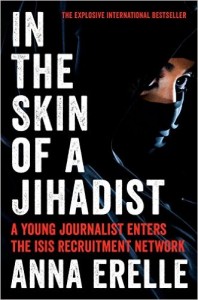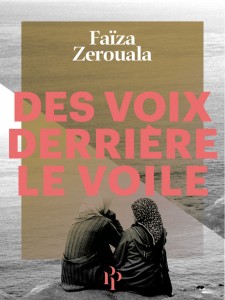
In the Skin of A Jihadist by Anne Erelle (not her real name) is a book about a French journalist pretending to be an ISIS fan and interacting with a French-speaking jihadist via Skype. This sentence occurs on the first page: “Do you really love me, Mélodie murmurs, her voice childish and frail.”
That one sentence, and the cover, should be enough to clue you in: sprinkled throughout the book’s 240 pages are passages that read like a sheik romance novel met an Islamic peril book by Jean Sasson. The prose becomes more sober and analytical in the parts narrated by the journalist rather than her alterego Melodie, but the book offers little insight into the motivations of young people joining ISIS – what you do get is an in depth look at the motivations of a journalist intent on literally flirting with danger from the safety of her home, and then sensationalizing and selling her experience based on current interest in ISIS.
At some points, the prose is less than coherent. For example, after a long passage wondering why people would be interested in joining ISIS, the journalist reasons that Germany fell into Hitler’s hands and some intellectuals in the 1970s liked Mao. Okay. Makes sense. But the passage is capped, out of the blue, with this: “However, I’m not talking about the Koran, which has nothing to do with fanatic ideology.”
Well, you weren’t talking about the Koran, but now that you are, perhaps elaborate?
No. The immediate next sentence is about how journalist is “no longer a respected profession.” Perhaps because of books like this, I found myself thinking.
Here’s another sample, less incoherent this time, but kind of indicative of the bouncing around that goes on throughout the book:
Abu Bilel was diabolical. I examined his profile picture. He was rather good-looking. The sunning grammatical errors barely distracted from the force of his conviction. What had drawn him to radicalism?
Just in case you were hoping for some insight into Abu Bilel’s motivations, there is very little beyond a vague character description. The confusion is reflected in the constant going back and forth between Abu Bilel and Bilel as though they were interchangeable. Erelle clearly does not have much analystical insight to offer, and this something she admits early on: “I’m a journalist, and though I’m keenly interested in geopolitics, I’m not an expert.” What she offers instead is her experience being Mélodie, mimicking the ISIS-struck teenagers and trying to “use teen vocabularly.” And then, in the times when she is not Mélodie, she reacts to her experience chatting with Abu Bilel with some bland commentary, a dab of genuinely thoughtful reflection, and outbursts that made me suspect she didn’t have to try very hard to pretend to be a teenager. For example: “it made me so angry, I wanted to punch him.” To me, this sounds more like someone upset with a family member than someone reacting to the dastardly deeds of ISIS.
The journalist creates a fictional twitter account to “keep an eye on current events” – as her profile picture, she uses a “cartoon image of Princess Jasmine from the Disney movie Aladdin.” What are we meant to conclude from this? Is it the journalist or the ISIS fan who is playing with the Orientalist fantasy? Read the book and decide for yourself. Or, on second thoughts, don’t, because you’ll have to weather through passages like this for the few bits of lucid commentary:
Bilel stared at Melodie. His eyes were still accentuated with dark liner. They smoldered as he gazed at the young Melodie, as if trying to cast a spell.
The book as a whole reminded me of this recent article about the author Meike Ziervogel’s “almost” becoming Muslim, again, in a seeming bid to find some authoritative ground to stand on while writing about Muslim women and extremism. Maybe I am being cynical. But I’m justified. The image accompanying the article is a blue eyed woman holding a veil across her mouth and looking woeful. Are we not beyond all this yet?
I haven’t read Ziervogel’s novel about Muslim women and extremism yet, so I will admit I can’t really comment. But I have read Erelle’s journalistic account, and my conclusion is that the actual readable journalistic content in Erelle’s book could have fit into half the book, or less. The rest of it is filling. This is reflected in the few negative reviews of the book on Amazon – as one reader puts it, “I can’t help feeling that I haven’t really learned anything I didn’t know before or couldn’t imagine myself.” But as mentioned, the negative reviews are in the minority. Erelle’s formula seems to be selling well, based on the readers who are thrilled to be reading something so current, excited by the idea that they too can slip “into the skin of a jihadist” from the comfort of their home.














